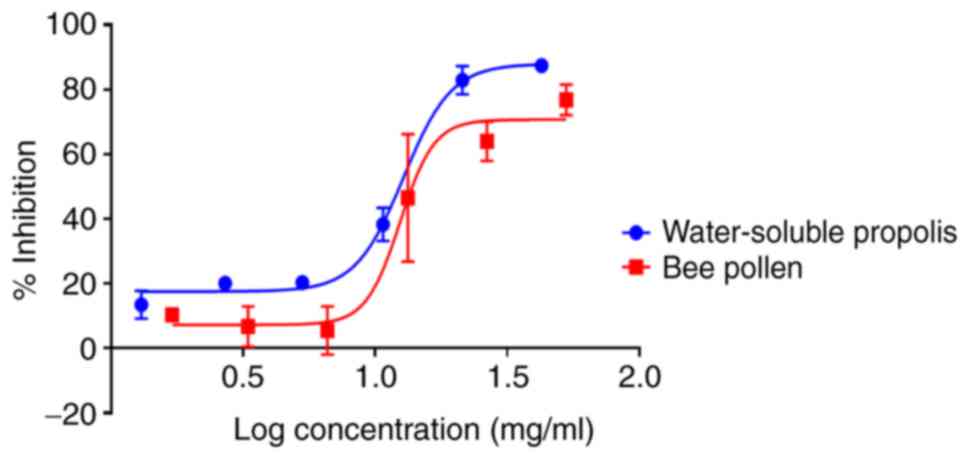|
1
|
WHO, . Breast cancer WHO. 2019, https://www.who.int/cancer/prevention/diagnosis-screening/breast-cancer/en/Dec
15–2019
|
|
2
|
Shah R, Rosso K and Nathanson SD:
Pathogenesis, prevention, diagnosis and treatment of breast cancer.
World J Clin Oncol. 5:283–298. 2014. View Article : Google Scholar : PubMed/NCBI
|
|
3
|
Amalia E, Diantini1 A and Subarnas A:
Overview of current and future targets of breast cancer medicines.
J Pharm Sci Res. 11:2385–2397. 2019.
|
|
4
|
Siddiqui AA, Iram F, Siddiqui S and Sahu
K: Role of natural products in drug discovery process. Int J Drug
Dev Res. 6:172–204. 2016.
|
|
5
|
Lichota A and Gwozdzinski K: Anticancer
activity of natural compounds from plant and marine environment.
Int J Mol Sci. 19:35332018. View Article : Google Scholar
|
|
6
|
Choudhari MK, Haghniaz R, Rajwade JM and
Paknikar KM: Anticancer activity of Indian stingless bee propolis:
An in vitro study. Evid Based Complement Alternat Med.
2013:9282802013. View Article : Google Scholar : PubMed/NCBI
|
|
7
|
Omene C, Kalac M, Wu J, Marchi E, Frenkel
K and OConnor OA: Propolis and its active component, caffeic acid
phenethyl ester (CAPE), modulate breast cancer therapeutic targets
via an epigenetically mediated mechanism of action. J Cancer Sci
Ther. 5:334–342. 2013.PubMed/NCBI
|
|
8
|
Kustiawan PM, Puthong S, Arung ET and
Chanchao C: In vitro cytotoxicity of Indonesian stingless bee
products against human cancer cell lines. Asian Pac J Trop Biomed.
4:549–556. 2014. View Article : Google Scholar : PubMed/NCBI
|
|
9
|
Mărghitaş LA, Dezmirean D, Drâglă F and
Bobiş O: Caffeic acid phenethyl ester (CAPE) in Romanian propolis.
Bull UASVM Anim Sci Biotechnol. 71:111–114. 2014.
|
|
10
|
Portokalakis I, Mohd Yusof HI, Ghanotakis
DF, Nigam PS and Owusu-Apenten RK: Manuka honey-induced
cytotoxicity against MCF7 breast cancer cells is correlated to
total phenol content and antioxidant power. J Adv Biol Biotechnol.
8:1–10. 2016. View Article : Google Scholar
|
|
11
|
Mahani, Nurhadi B, Subroto E and
Herudiyanto M: Bee propolis Trigona spp. potential and
uniqueness in Indonesia. Proc Univ Malaysia Teren Annu Sci.
2011:2011.
|
|
12
|
Riswahyuli Y, Rohman A, Setyabudi FMCS and
Raharjo S: Indonesian wild honey authenticity analysis using
attenuated total reflectance-fourier transform infrared (ATR-FTIR)
spectroscopy combined with multivariate statistical techniques.
Heliyon. 6:e036622020. View Article : Google Scholar : PubMed/NCBI
|
|
13
|
Kitamura H: Effects of propolis extract
and propolis-derived compounds on obesity and diabetes: Knowledge
from cellular and animal models. Molecules. 24:43942019. View Article : Google Scholar
|
|
14
|
Murtaza G, Karim S, Akram MR, Khan SA,
Azhar S, Mumtaz A and Bin Asad MH: Caffeic acid phenethyl ester and
therapeutic potentials. Biomed Res Int. 2014:1453422014. View Article : Google Scholar : PubMed/NCBI
|
|
15
|
American Type Culture Collection: SOP:
Thawing, Propagating and Cryopreserving of NCI-PBCF-HTB22 (MCF-7).
Version 1.6. 2012.
|
|
16
|
García-Viguera C, Ferreres F and
Tomás-Barberán FA: Study of canadian propolis by GC-MS and HPLC. Z
Natforsc C. 48c:731–735. 1993. View Article : Google Scholar
|
|
17
|
Ji LI, Larregieu CA and Benet LZ:
Classification of natural products as sources of drugs according to
the biopharmaceutics drug disposition classification system
(BDDCS). Chin J Nat Med. 14:888–897. 2016.PubMed/NCBI
|
|
18
|
Tsume Y, Mudie DM, Langguth P, Amidon GE
and Amidon GL: The biopharmaceutics classification system:
Subclasses for in vivo predictive dissolution (IPD) methodology and
IVIVC. Eur J Pharm Sci. 57:152–163. 2014. View Article : Google Scholar : PubMed/NCBI
|
|
19
|
Irnawati, Purba M, Mujadilah R and
Sarmayani: Penetapan kadar vitamin C DAN UJI aktifitas antioksidan
sari buah songi (Dillenia serrata Thunb.) terhadap radikal
DPPH (Diphenylpicrylhydrazyl). Pharmacon. 6:40–44. 2017.(In
Indonesian).
|
|
20
|
Bankovaa VS, de Castro SL and Marcucci MC:
Propolis: Recent advances in chemistry and plant origin.
Apidologie. 31:3–15. 2000. View Article : Google Scholar
|
|
21
|
Ahmed S and Othman NH: The anti-cancer
effects of Tualang honey in modulating breast carcinogenesis: An
experimental animal study. BMC Complement Altern Med. 17:2082017.
View Article : Google Scholar : PubMed/NCBI
|
|
22
|
Wlodkowic D, Skommer J and Darzynkiewicz
Z: Flow cytometery-based apoptosis detection. Methods Mol Biol.
559:19–32. 2009. View Article : Google Scholar : PubMed/NCBI
|
|
23
|
Hingorani R, Deng J, Elia J, McIntyre C
and Mittar D: Detection of apoptosis using the BD Annexin V FITC
assay on the BD FACSVerse™ system. BD Bioscience application note.
2011:1–12. 2011.
|
|
24
|
Comşa Ş, Cîmpean AM and Raica M: The story
of MCF-7 breast cancer cell line: 40 tears of experience in
research. Anticancer Res. 35:3147–3154. 2015.PubMed/NCBI
|
|
25
|
Camarillo IG, Xiao F, Madhivanan S,
Salameh T, Nichols M, Reece LM, Leary JF, Otto KJ, Natarajan A,
Ramesh A and Sundararajan R: Low and high voltage
electrochemotherapy for breast cancer: An in vitro model study.
Electroporation Based Therapies Cancer. 55–102. 2014. View Article : Google Scholar
|
|
26
|
Kiosses WB, Hahn KM, Giannelly G and
Quaranta V: Characterization of morphological and cytoskeletal
changes in MCF10A breast epithelial cells plated on Laminin-5:
Comparison with breast cancer cell line MCF7. Cell Commun Adhes.
8:29–44. 2001. View Article : Google Scholar : PubMed/NCBI
|
|
27
|
Reed JC: Mechanisms of apoptosis. Am J
Pathol. 157:1415–1430. 2000. View Article : Google Scholar : PubMed/NCBI
|
|
28
|
Niknafs B: Induction of apoptosis and
non-apoptosis in human breast cancer cell line (MCF-7) by cisplatin
and caffeine. Iran Biomed J. 15:130–133. 2011.PubMed/NCBI
|






















